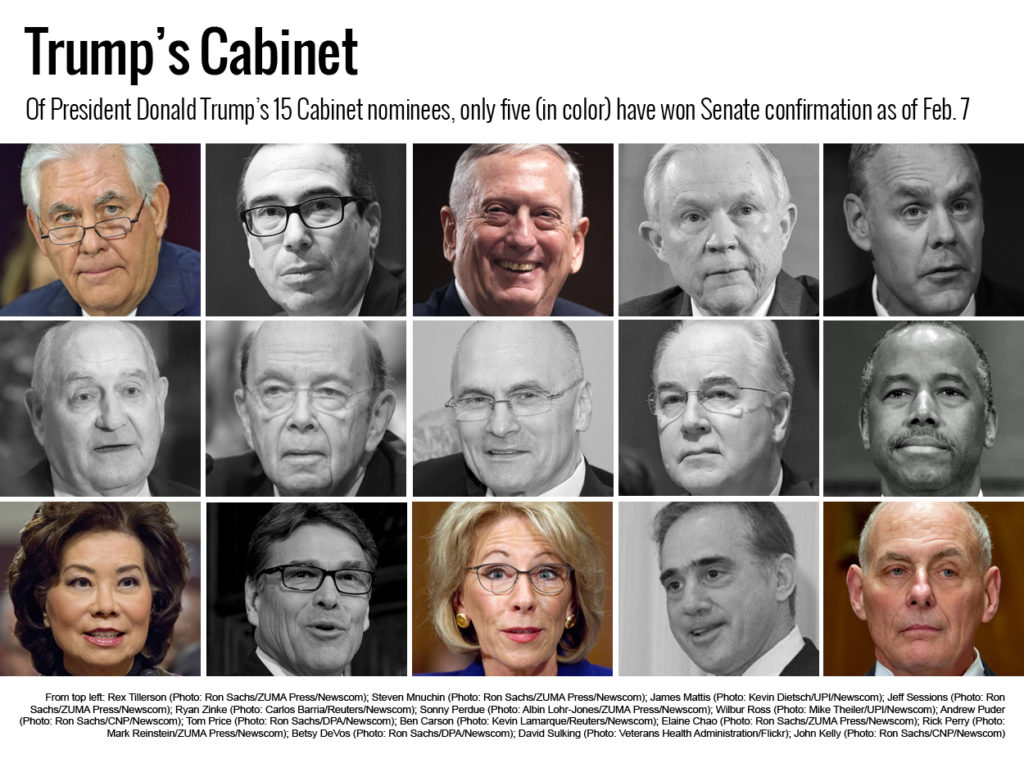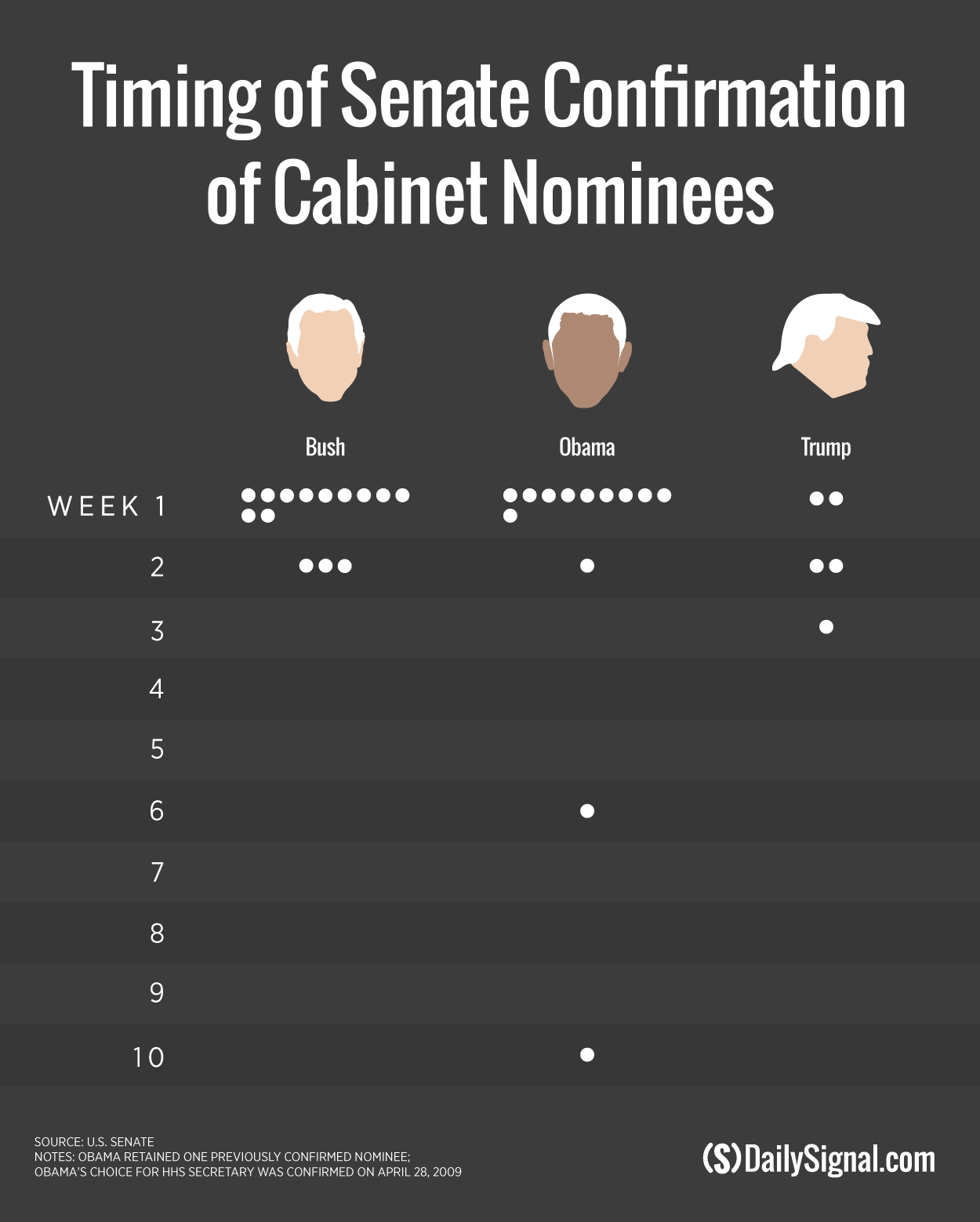Trump Faces Senate Boycotts on Nominees That Bush, Obama Didn’t
Melissa Quinn /
Since the Senate started holding hearings on President Donald Trump’s Cabinet and Cabinet-level nominations, Senate Democrats have employed a variety of tactics to delay the votes needed for Trump to put the government’s leaders in place.
Republicans have called Democrats’ actions “unprecedented,” but are they?
A review by The Daily Signal of committee actions for first-term Cabinet and Cabinet-level nominees dating back to the initial days of President George W. Bush’s administration—the earliest for which electronic congressional records could be found—shows that efforts from the minority party to tie up nominations are rare and a break from Senate tradition.
“In the Senate, there’s a presumption that the president is entitled to pick the Cabinet,” Jack Pitney, a political science professor at Claremont McKenna College in California, told The Daily Signal.
“Things are different given the general polarization of the Senate and the specific atmosphere that we’re seeing in the early weeks of the Trump administration,” Pitney said.
By the start of the new year, Senate Democrats had mapped out their plan to stall confirmation votes for eight of Trump’s Cabinet nominations and draw out the confirmation process into March.
And since Trump’s Jan. 20 inauguration, Democrats serving on three Senate committees have stalled votes by boycotting meetings—that is, refusing to show up. For Trump’s two predecessors, some nominees passed out of their respective committees without any objection from either party.
But not only are Democrats stalling votes at the committee level—the first stop for a presidential nominee requiring Senate confirmation—the minority party is expected to employ other tactics to stymie approval of nominees once they advance to the Senate floor.
“President Trump has the fewest Cabinet secretaries confirmed at this point than any other incoming president since George Washington,” Senate Majority Leader Mitch McConnell, R-Ky., said Tuesday. He called on Democrats to end “the unprecedented delay” holding up confirmation of Trump’s nominees.

The recent actions of Senate Democrats break from Senate tradition and split from the precedent members of both parties set for past presidents and their agency leads.
In fact, senators in both parties boycotted just two Cabinet-level nominees over the past 17 years, and neither were during a president’s first term.
Trump Administration Nominees
Last month, Democrats on the Senate Judiciary Committee made lengthy speeches to delay a vote on Trump’s nominee for attorney general, Sen. Jeff Sessions, R-Ala.
Judiciary Chairman Chuck Grassley, a Republican from Iowa, ultimately delayed the committee’s vote on Sessions by one day. The panel then voted along party lines to advance Sessions’ nomination, 11-9.
In more blatant displays of disapproval for Trump’s Cabinet nominees, Democrats on two Senate panels boycotted committee votes on three nominees: for the secretaries of both Health and Human Services and Treasury, and for the administrator of the Environmental Protection Agency.
Trump nominated Rep. Tom Price, R-Ga., to head the Department of Health and Human Services, Wall Street executive Steve Mnuchin to lead the Department of Treasury, and Oklahoma Attorney General Scott Pruitt to serve as administrator of the Environmental Protection Agency.
The Finance Committee oversees the Price and Mnuchin nominations, and the Environment and Public Works Committee oversees the Pruitt nomination.
Last month, Democrats on both committees refused to appear at meetings held to vote on the nominees.
For the Finance Committee, Democrats’ boycott represented a first: In modern history, the panel never before boycotted a confirmation vote.
In addition to boycotting the vote by the Environment and Public Works Committee, Democrats tasked with overseeing Pruitt’s nomination submitted 1,078 questions to the Oklahoma attorney general.
Because Democrats refused to show up, they forced Republicans to delay votes on Price, Mnuchin and Pruitt.
Obama Administration Nominees
In 2013, at the beginning of President Barack Obama’s second term, all eight Republicans on the Environment and Public Works Committee boycotted a committee vote on Gina McCarthy, his pick to lead the Environmental Protection Agency.
GOP senators also asked McCarthy to respond to 1,075 written questions about the agency she sought to lead.
After Republicans dropped their boycott, McCarthy, who replaced Lisa Jackson at the EPA, ultimately advanced to the Senate in a 10-8 vote along party lines.
By comparison, Jackson received 157 questions from Senate Republicans after her initial confirmation hearing in 2009.
After Obama tapped agency heads during his first term, Republicans and Democrats took swift action to confirm his nominees.
The Senate unanimously confirmed seven of Obama’s Cabinet and Cabinet-level nominees immediately after his inauguration, and many received bipartisan support at the committee level.
Secretary of State Hillary Clinton, for example, won approval from the Foreign Relations Committee after a 16-1 vote.
Obama’s pick for attorney general, Eric Holder, also received support from both sides of the aisle. Holder advanced to the Senate floor after the Judiciary Committee’s 17-2 vote.
The Senate confirmed six more of Obama’s selections in the week following his inauguration.
Bush Administration Nominees
More than two year into President George W. Bush’s first term, Senate Democrats mounted opposition to his pick to lead the EPA, Utah Gov. Michael Leavitt.
Bush selected Leavitt in 2003 to replace his first EPA administrator, Christine Todd Whitman, and Democrats sought to tie up Leavitt’s nomination by refusing to attend a committee meeting to advance his nomination.
Senate Democrats later asked Leavitt a total of 305 questions after his confirmation hearing.
Once Democrats allowed his nomination to proceed, the Environment and Public Works Committee approved Leavitt by a bipartisan vote of 16-2.
Like Obama, the Senate confirmed eight of Bush’s nominees on his Inauguration Day.
Bush’s most controversial nominee, John Ashcroft for attorney general, faced opposition from Democrats on the Judiciary Committee. However, Ashcroft advanced to the Senate floor after a 10-8 vote.
Opening the Door
Though the opposition to Trump’s Cabinet nominees is unprecedented, Pitney, of Claremont McKenna, said it’s likely such attempts to stall nominations will continue.
“You’re not going to get away from the polarization any time in the next few years,” he said. “What we’re seeing now is just the latest chapter of a story that’s been unfolding for decades.”


